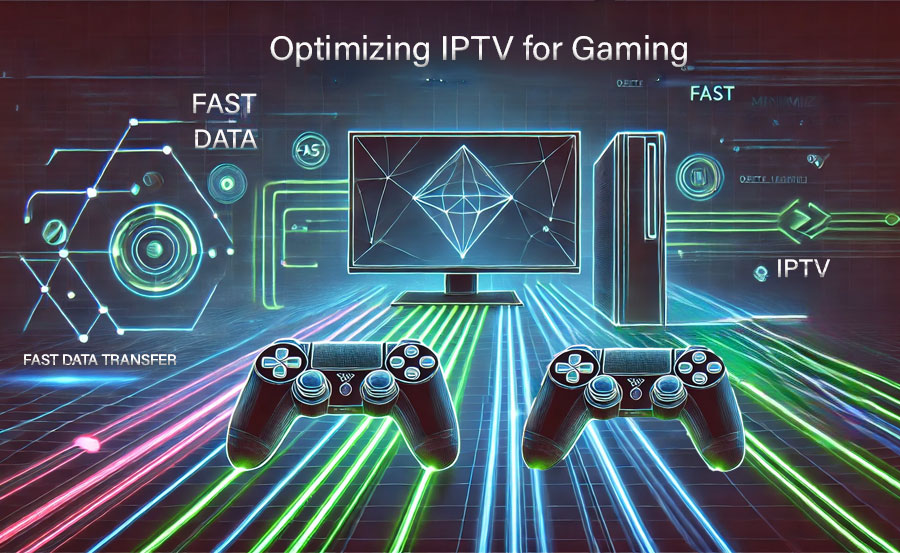The world of gaming has shifted dramatically in recent years, with online and cloud-based games taking center stage. Alongside this evolution, IPTV (Internet Protocol Television) has emerged as a go-to choice for streaming media and live television. However, when combining IPTV streaming and gaming on the same network, performance can take a hit if not optimized properly. In this article, we’ll explore how you can optimize your IPTV setup for gaming, minimize latency and lag, and ensure a smooth experience whether you’re watching TV or playing your favorite online games.
Buy 3 Months IPTV Subscription Now
Understanding the Impact of IPTV on Gaming Performance
IPTV uses your internet connection to deliver live TV and on-demand content, similar to how online games use the same connection for real-time interaction with servers. If both are competing for bandwidth, you may notice lag in your gaming, buffering in your streams, or both. This overlap occurs because IPTV streams consume a significant amount of bandwidth, especially when streaming in HD or 4K, which may lead to high latency or slower response times in online games.
Latency, also known as “ping,” refers to the time it takes for data to travel from your device to the game server and back. High latency results in delayed actions, making fast-paced games difficult to enjoy. Similarly, lag happens when data processing is delayed, causing glitches or interruptions in your gaming experience.
To prevent these issues, it’s crucial to optimize both your IPTV and gaming connections, ensuring minimal interference between the two.
Tips for Minimizing Latency and Lag
- Upgrade Your Internet Speed The first step in optimizing IPTV for gaming is ensuring your internet connection has sufficient bandwidth to handle both activities simultaneously. High-speed internet is essential for smooth IPTV streaming and online gaming. For gaming and IPTV in HD or 4K, aim for an internet speed of at least 50 Mbps or higher.
- Use a Wired Ethernet Connection Wi-Fi is convenient, but it’s also prone to interference and slower speeds, especially when multiple devices are connected. For both gaming and IPTV streaming, using a wired Ethernet connection is ideal. A direct connection to your router minimizes latency and ensures a more stable, high-speed connection.
- Enable QoS (Quality of Service) on Your Router Many modern routers have a feature called QoS, which allows you to prioritize specific devices or activities over others. By configuring QoS settings, you can allocate more bandwidth to your gaming console or PC and ensure that it takes priority over IPTV streaming, minimizing lag during gameplay. This ensures that your game receives the bandwidth it needs while IPTV streaming runs in the background.
- Optimize IPTV Streaming Settings Most IPTV services allow you to adjust streaming quality. If you notice lag in your game, try reducing the IPTV stream quality from 4K to 1080p or even 720p. Lowering the stream resolution consumes less bandwidth, freeing up resources for gaming.
- Check for Network Congestion Network congestion occurs when too many devices are connected to the same network at once. If you live in a household with multiple users streaming, gaming, or downloading content, you may experience lag. Try to limit the number of devices using the network simultaneously, or schedule gaming sessions during low-traffic times in your home.
- Update Your Router Firmware Router manufacturers often release firmware updates that include performance enhancements, security fixes, and new features like improved QoS or bandwidth management. Keeping your router’s firmware up to date can help improve overall network performance, reducing latency for gaming while streaming IPTV.
- Invest in a Gaming Router If you are a serious gamer, consider investing in a gaming-specific router. These routers are designed to prioritize gaming traffic and offer advanced features like low-latency technology, higher processing power, and more refined QoS settings. This can greatly enhance your gaming experience, even when IPTV is running in the background.
Secure Your IPTV Connection: Best Practices for Privacy and Safety
Balancing Gaming and IPTV Streaming
While gaming and IPTV streaming both demand high-speed internet, with the right setup, you can enjoy both without sacrificing performance. The key lies in smart bandwidth management and ensuring that each activity gets the resources it needs. Here are a few additional best practices to follow:
- Separate Networks: If possible, create two separate networks at home—one for IPTV streaming and another for gaming. This can be achieved by using a dual-band router that supports both 2.4GHz and 5GHz frequencies.
- Check Latency Before Gaming: Before starting an online gaming session, test your internet latency using tools like “ping” or websites like Speedtest. This will give you a good indication of whether your connection is ready for a lag-free gaming experience.
- Pause IPTV During High-Intensity Gaming: For high-stakes gaming sessions like tournaments, you may want to pause IPTV streaming entirely to focus on your gameplay and prevent any disruptions.
Optimizing IPTV for gaming requires a bit of fine-tuning, but with the right approach, you can minimize latency and enjoy a seamless experience. By upgrading your internet speed, using wired connections, enabling QoS, and managing bandwidth effectively, you can balance gaming and IPTV streaming without interruptions. Whether you’re watching live TV or engaged in an online battle, these tips will help you achieve the best possible performance for both activities.
IPTV and gaming don’t have to compete for your internet resources—with a few adjustments, they can coexist harmoniously, providing you with a rich entertainment experience across the board.
Cloud DVR and IPTV: How to Record and Save Your Favorite Shows


